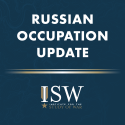Russian Offensive Campaign Assessment, April 27, 2025
Apr 27, 2025 - ISW Press
Ukrainian and Russian forces' constant technological and tactical battlefield innovations continue to transform the character of warfare in Ukraine.

Ukrainian and Russian forces' constant technological and tactical battlefield innovations continue to transform the character of warfare in Ukraine.

Russian Chief of the General Staff Army General Valery Gerasimov claimed on April 26 that Russian forces pushed all Ukrainian forces from Kursk Oblast. Gerasimov told Russian President Vladimir Putin on April 26 that Russian forces had fully defeated Ukrainian forces in Kursk Oblast and seized Gornal (southwest of Sudzha), the last Ukrainian-held settlement in Kursk Oblast.

Ukrainian and European representatives reportedly presented the United States with a proposal to end the war in Ukraine during multilateral talks in London on April 23.

Russia is extracting economic benefits from occupied Ukraine by exploiting Ukrainian infrastructure and logistics networks. The Russian Federal Agency for Railway Transport (Roszheldor) announced on April 21 that the first container train carrying unspecified cargo travelled along the Russian “Novorossiya Railways” network through occupied Ukraine and arrived in occupied Sevastopol.

The official Kremlin spokesperson and the Russian Security Council secretary repeated a series of long-standing Russian demands that purposely preclude the establishment of a stable and enduring peace in Ukraine and set conditions for future Russian aggression from an advantaged position.

The United States reportedly recently presented Ukraine with a seven-point proposal to end the war in Ukraine in which the United States would recognize Crimea as part of Russia and allow Russian forces to continue to occupy significant parts of southern and eastern Ukraine. Available reporting about the contents of the US proposal suggests that it marks a sudden and substantial change in the Trump administration's strategy for ending the war in Ukraine.

The Kremlin appears to be increasingly concerned with the Russian military's ability to retain forces in the event of demobilization following a ceasefire or a negotiated peace. Russian propagandist Anastasiya Kashevarova claimed on April 17 that the Kremlin assigned Russia’s military chiefs of staff in early April to survey contract servicemen and mobilized personnel about their intent to reenlist in the Russian military should Russia complete its war in Ukraine.

The Financial Times (FT) reported that Russian President Vladimir Putin is willing to end the war in Ukraine on the current frontlines. Kremlin officials, including Putin, have repeatedly and explicitly emphasized that Russia maintains its territorial demands over all of Donetsk, Luhansk, Zaporizhia, and Kherson oblasts, however, while also publicly signaling that Russia has greater territorial ambitions in Ukraine beyond these four oblasts.

Russian President Vladimir Putin rejected Ukrainian President Volodymyr Zelensky's April 20 proposal for a temporary moratorium on long-range strikes against civilian infrastructure, declined Zelensky's offer to extend Putin's own 30-hour Easter truce, and attempted to justify recent Russian strikes against civilian targets in Ukraine.

The snap Russian-proposed Easter truce underscores the necessity that the text of any ceasefire or peace agreement be publicly available, formally agreed to in advance by all parties, and include robust monitoring mechanisms.